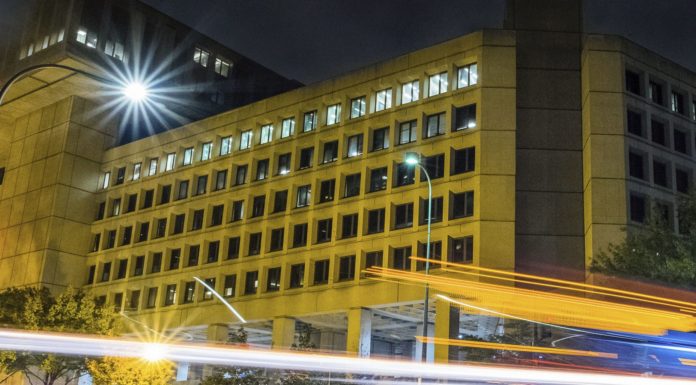(Ken Silva, Headline USA) A report released by the Department of Justice’s Office of the Inspector General on the FBI’s shoddy oversight of its operations also alluded to the bureau possibly having employees secretly operating in the media.
The OIG released this report Dec. 20 to little fanfare. Though heavily redacted, the document outlined the FBI’s failures to conduct proper oversight of its undercover activities.
“Short term undercover activities that are not part of a full, authorized operation are not tracked, so the FBI does not have any data on how often these activities occur and for what purpose,” the report said.
“The FBI tracks [undercover operations], but [REDACTED] activity is not tracked, reducing oversight and increasing the risks associated with this activity, including the risk of compromising agents’ safety and the integrity of other ongoing investigations.”
The Washington Times covered these findings, but the OIG audit has otherwise received little attention in the media. Even less attention has been paid to a footnote in the report that alluded to the FBI having undercover employees in the media.
The footnote is on page 20, where the OIG discussed undercover agents operating in “sensitive circumstances.” The footnote explained that “sensitive circumstances are situations that merit a higher level of oversight.”
“For example, an FBI employee posing as a member of the press is a sensitive circumstance,” the footnote informed.
Neither the FBI nor the OIG immediately responded to Headline USA questions about whether the bureau does, in fact, have undercover employees posing as media members. There is no publicly documented case of such a scenario.
However, there are numerous instances of FBI informants working in the media. Private investigator Roger Charles first discovered this more than a decade ago, finding an FBI memo about an ABC journalist doubling as an FBI informant at the time.
“The journalist, whose name is not disclosed in the document labeled ‘secret,’ not only cooperated but provided the identity of a confidential source, according to the FBI memo — a possible breach of journalistic ethics if he or she did not have the source’s permission,” The Center for Public Integrity wrote in April 2011 about Charles’s discovery.
“The ABC employee was even assigned a number in the FBI’s informant database, indicating he or she was still being vetted for suitability as a snitch after providing ‘highly accurate and reliable information in the past.’”
Other memos showed that the FBI had another, separate informant providing information about ABC, as well as an informant providing information about NBC’s plans to report about the Oklahoma City bombing.
These memos were originally obtained by Utah attorney Jesse Trentadue, who has been in a four-year legal fight with the FBI over his brother’s murder. Trentadue sued the FBI in 2012 for bureau records about how many informants the FBI has in the media, as well as other “sensitive” institutions such as the courts, Congress and other government agencies.
Trentadue’s lawsuit was ultimately tossed in 2015, with U.S. Judge Dale Kimball ruling that the FBI could exercise its national security exemptions to keep records about its informants secret.
Trentadue argued that his FOIA litigation, coupled with the FBI memos he’s procured, demonstrated that the FBI has much to hide about its use of sensitive informants.
“Yes, the FBI does need sensitive informants to, as you say, investigate corruption and potential violent groups. Yes, the FBI should have manuals to make sure that these are done legally. But the key is that I asked for manuals governing ‘recruitment/management’ of specific informants, which the FBI produced but redacted,” he told Headline USA.
“It is not a case of someone coming to the FBI offering to expose corruption. The bureau is recruiting spies.”
Ken Silva is a staff writer at Headline USA. Follow him at twitter.com/jd_cashless.



